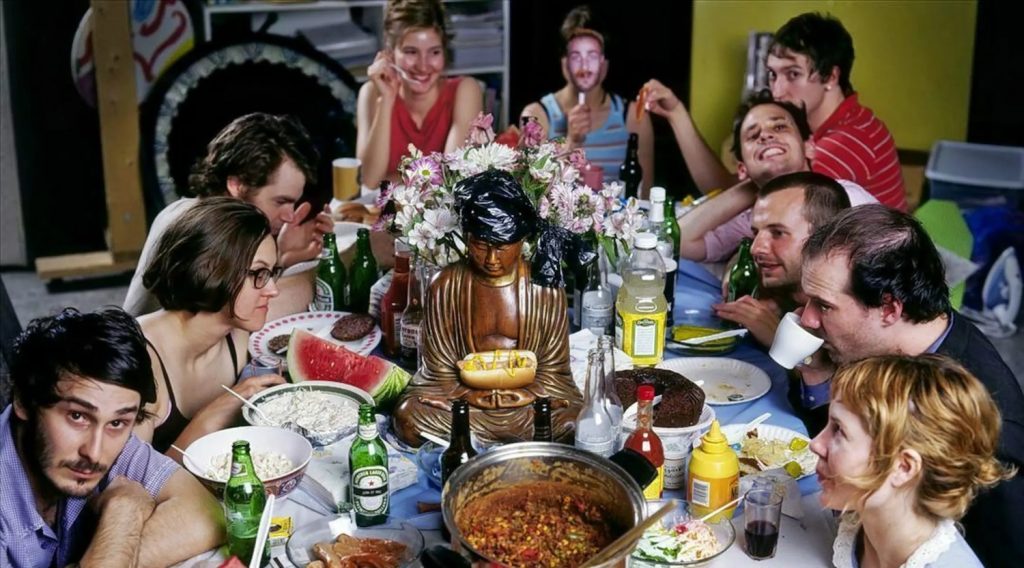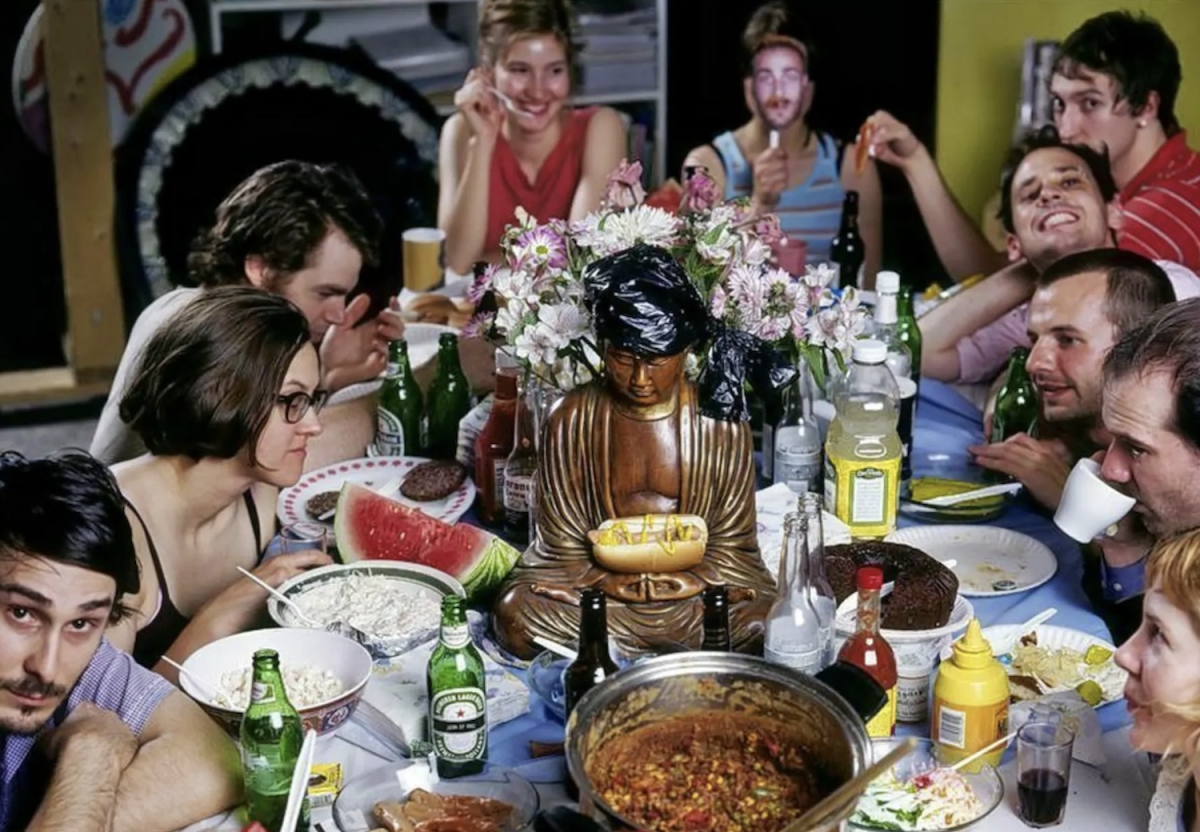
“I think about half of the stuff we do is fucking awesome,” says Mike Kinsella, drummer for Joan Of Arc. “And half of it fucking sucks.”
Well, the historical Jeanne d’Arc had her share of hecklers, too—though maybe not in her own family. But here we’re concerned not with a doomed visionary maiden, but a damned visionary man: Tim Kinsella, who with brother Mike and Sam Zurick assumed the Joan Of Arc moniker in 1996 and proceeded to drop a string of albums that split critics and listeners (and band members, apparently) down the middle. Depending on the listener—and often on the album—Joan Of Arc is either avant-garde rock at its most literate and creative or its most addlepated and precious.
At the center of the hosannas and brickbats stands the unassuming Tim Kinsella. For a decade, Tim has been the lead writer and voice of Joan Of Arc, the only constant member in an ever-rotating lineup. Tim’s enigmatic lyrics, love-it-or-hate-it warble and gleeful willingness to dismantle his own songs drive JOA’s aesthetic. These same qualities, unsurprisingly, are the ones that have divided the masses ever since the brothers Kinsella and Zurick were high-school malcontents in Midwestern suburbia, strangling punk covers of a-ha and the Beverly Hills, 90210 theme.
1990-1995
Joan Of Arc begins life as Cap’n Jazz: Tim on vocals, Mike on drums, Zurick on bass and Victor Villareal on guitar. All members are in high school or junior high when the band forms, more or less on a lark. Though cited in numerous revisionist accounts as an influential band in the early Midwestern emo scene—Davey von Bohlen serves time in Cap’n Jazz before forming the Promise Ring—the Chicago band’s impact is mainly regional. Most of its recorded output goes to split seven-inches and compilation albums for short-lived indie labels.
Cap’n Jazz’s only full-length appears on the Man With Gun label in 1995 and almost immediately goes out of print. Its most infamous recording, a charmingly amateurish cover of a-ha’s “Take On Me,” is slotted for inclusion on a ’80s-covers compilation that never materializes. The group’s cover of “Winter Wonderland” on the 1993 A Very Punk Christmas compilation, featuring the Kinsellas’ mother and cousins on keyboards and backing vocals, prompts Screeching Weasel frontman Ben Weasel to call Cap’n Jazz “the cruddiest and most pretentious band in Chicago,” a phrase that will resurface in Joan Of Arc’s press for years to come.
In July 1995, during the first week of a three-week tour, personality conflicts between the group’s rhythm section and Villareal cause Cap’n Jazz to implode.
1996-2000
Tim begins playing guitar in various settings, consciously avoiding Cap’n Jazz’s post-punk leanings.
“I basically had two outlets at the time,” says Tim. “I was playing with Jeremy Boyle, who was doing a lot of soundscape and loop stuff. I was also playing more rock-type stuff with Sam, Mike and Erik (Bocek). So we ended up combining those two outlets to create the band.”
Originally dubbed Red Blue Yellow, the band plays one show before changing its name to Joan Of Arc, a decision prompted by Tim hearing the Smiths’ “Bigmouth Strikes Again” (with the lyric “now I know how Joan Of Arc felt”) and Leonard Cohen’s “Joan Of Arc” in a five-minute span. Joan Of Arc is the polar opposite of Cap’n Jazz: cerebral and crisply recorded, lyrically enigmatic and musically minimalist. Stripped of hardcore’s rigid postures, Tim’s songs become roomier and less cluttered, incorporating electronics and tape loops into a cleaner, more controlled sound.
“Tim was the mastermind,” says Mike, who wafts in and out of the band at will during its first five years. “But I don’t think he knew specifically what he wanted to do. It was more like he knew what he didn’t want.”
“Joan Of Arc was a lot more introspective,” says Zurick. “I don’t know if that was a conscious decision, but we knew we wanted to do something besides rock out. We wanted to see what else we were capable of.”
With increasing reliance on post-production tinkering and software effects, Joan Of Arc develops its signature fragmented, coolly technological sound. Heard in sequence, this approach lends the group’s first four records a steadily mounting level of experimental edginess. With The Gap, an album assembled almost entirely on ProTools, the line between artistic experimentation and fucking up a perfectly acceptable song for the sake of doing so starts to blur.
“I got a copy of The Gap and put it on as I got into bed,” says Darren Walters, co-owner of Jade Tree, which signed JOA in 1997. “There were all these punch-outs and sirens and windows crashing. It was really unsettling to listen to. That was probably the point where our interests started to diverge from Tim’s.”
Following the uniformly abysmal reviews of The Gap, Joan Of Arc disbands.
2001-2003
Tim issues an album under the name Friend/Enemy with Todd Mattei, who’d joined JOA on Live In Chicago 1999. A collection of mid-’90s tracks recorded with a band called the Sky Corvair during downtime from Cap’n Jazz is released and hailed as a lost emo classic. Tim also issues a well-received solo EP, He Sang His Didn’t He Danced His Did.
As one of the universe’s great practical jokes, original Cap’n Jazz guitarist Villareal reconnects with the Kinsellas and Zurick soon after JOA’s breakup. In 2001, the foursome releases a rock-oriented, Steve Albini-recorded album under the name Owls but splits up soon afterward for precisely the same reasons as before.
“We had a tour and studio time scheduled, and [Villareal] just took off one day and disappeared,” says Tim. “But we were still writing and recording songs and wondering what to call it, until finally we said, ‘Hey, there’s no reason to come up with a totally new band name. We’ve got a perfectly good name lying around.’”
And Joan Of Arc, so to speak, rises from the ashes. The reformed group releases two albums, So Much Staying Alive And Lovelessness and In Rape Fantasy And Terror Sex We Trust. On In Rape Fantasy in particular, Tim’s muse seems to take a darker, more urgent turn, his vocal performances sounding more clamorous and discordant than ever.
“The difference between the Clinton and Bush eras seems to be an overwhelming sense of dread and paranoia,” says Tim. “So the records certainly took on a charge after [2001]. I remember being 24 and thinking, ‘During the fall of the Roman Empire, would I rather have been a soldier or a guy who works in a market or a drunken traveling bard?’ Those records were a way of speaking back to culture, reacting to the bubble we all live in.”
2004-2006
Tim’s songwriting reaches a conceptual apex with Joan Of Arc, Dick Cheney, Mark Twain…, a collection of songs loosely centered around the notion of defunct systems—political, familial and personal—and the flotsam of American cultural life in the 21st century. While it’s well-received in the press, a repeated gripe is that Tim simply name-checked entities such as Cheney, Clear Channel and Friendster to no argumentative purpose.
“I don’t have a specific agenda to push on anyone,” he says. “The best I can do is name these things; you can’t even deal with a problem before you name it. [The record] wasn’t supposed to be a prescription; it’s a diagnosis.”
Next comes Joan Of Arc Presents Guitar Duets, an unfairly overlooked record presenting a series of live-in-the-studio performances by 10 current and former band members. Assembled by drawing names from a hat and pairing players at random, the instrumental album is like a topographical history of Joan Of Arc’s various modes: some fragile and pretty, others raucous and atonal.
2006 brings new albums by Mike’s solo project Owen (At Home With Owen), the Tim-led quartet Make Believe (Of Course) and two new Joan Of Arc releases: The Intelligent Design Of Joan Of Arc (a collection of singles and compilation tracks) and Eventually, All At Once (a mostly acoustic, astonishingly pretty album of new material). Though Tim had written most of the album prior to this event, the death of his and Mike’s father predated the finishing overdubs and final arrangements.
“It’s not an album of mourning,” says Tim. “But assembling this record was a way of starting to interact with the world again.”
At the 10-year mark, Joan Of Arc has taken more shots than the average post-rock outfit. But Tim has reached a level of comfort with the repeated complaints that the band is too cerebral for its own good.
“We get called pretentious all the time, and that seems a really superficial assessment,” he says. “I think there’s a lot of humor in our music—though it doesn’t seem to register with a lot of people—and a lot of abstraction. There are definitely certain character viewpoints that certain songs are sung from, and different records will have a different range of characters. That can create a kind of distance that people might read as pretentious.”
Zurick offers a more succinct metaphor: “It’s like walking up to strangers and tickling them. They might like it, or you might get punched out. I’d rather irritate people than not do anything to them.”
—Eric Waggoner







One reply on “Joan Of Arc: For These Chicago Avant-Rock Vets, It’s Mind Over Martyr”
[…] deserve credit for this much: Ben Weasel’s callout of The Kinsella Brothers is the kind of healthy impromptu criticism I wholeheartedly endorse. […]